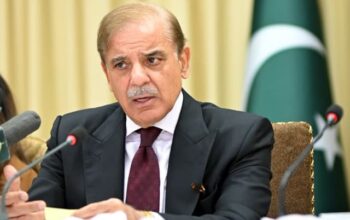By Staff Reporter
ISLAMABAD: The International Monetary Fund (IMF) and Pakistan have agreed on a staff-level deal for the first review of a $7 billion Extended Fund Facility (EFF) and a new $1.3 billion Resilience and Sustainability Facility (RSF), the IMF said Tuesday.
The agreement, subject to IMF Executive Board approval, unlocks $1 billion under the EFF, bringing total disbursements to $2 billion, and provides $1.3 billion over 28 months under the RSF.
Pakistan had requested $1 billion from the IMF’s Resilience and Sustainability Trust (RSF) in October. An IMF team, led by Nathan Porter, concluded talks with Pakistani officials in Karachi, Islamabad, and virtually from February 24 to March 14.
“The IMF team has reached a staff-level agreement (SLA) with the Pakistani authorities on the first review of the 37-month Extended Arrangement under the Extended Fund Facility (EFF) and on a new 28-month arrangement under the IMF’s RSF,” Porter was quoted as saying in the statement. “Upon approval by the IMF board, Pakistan will have access to about $1 billion under the EFF, bringing total disbursements under the program to about $2 billion.”
The funding under RSF is made available to nations that commit to high-quality reforms to build resilience against climate catastrophes through adaptation. It is repayable over 30 years, including a 10-year grace period, and is normally cheaper than terms for an Extended Fund Facility (EFF), such as the $7 billion loan program with Pakistan, which is underway.
“The RSF will support Pakistan’s efforts in building resilience to natural disasters, enhancing budget and investment planning to promote climate adaptation, improving the efficient and productive use of water, strengthening the climate information architecture to improve disclosure of climate risks, and aligning energy sector reforms with mitigation targets,” the IMF said.
The EFF, secured mid-year in 2024, has played a key role in stabilizing the economy, and the government has said the country is on course for a long-term recovery.
The IMF praised Pakistan’s strides in stabilising its economy. “Over the past 18 months, Pakistan has made significant progress in restoring macroeconomic stability and rebuilding confidence despite a challenging global environment,” Porter noted. “The authorities remain committed to advancing a gradual fiscal consolidation to sustainably reduce public debt.”
The IMF said Pakistan’s inflation rate has declined to its lowest level since 2015, while financial conditions have improved and sovereign spreads have narrowed. Economic growth remains moderate, with external balances strengthening.
However, the economy still faces elevated downside risks, including geopolitical shocks to commodity prices, tightening global financial conditions, and rising protectionism.
“… it is critical to stay the course and entrench the progress achieved over the past one and a half years, building resilience by further strengthening public finances, ensuring price stability, rebuilding external buffers, and eliminating distortions in support of stronger, inclusive, and sustained private sector-led growth,” the IMF said.
Copyright © 2021 Independent Pakistan | All rights reserved




